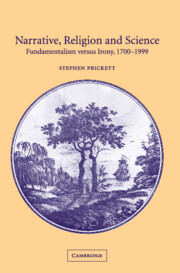Book contents
- Frontmatter
- Contents
- Acknowledgements
- Introduction: Arthur Dent, Screwtape and the mysteries of story-telling
- 1 Postmodernism, grand narratives and just-so stories
- 2 Newton and Kissinger: Science as irony?
- 3 Learning to say ‘I’: Literature and subjectivity
- 4 Reconstructing religion: Fragmentation, typology and symbolism
- 5 The ache in the missing limb: Language, truth and presence
- 6 Twentieth-century fundamentalisms: Theology, truth and irony
- 7 Science and religion: Language, metaphor and consilience
- Concluding conversational postscript: The tomb of Napoleon
- Bibliography
- Index
3 - Learning to say ‘I’: Literature and subjectivity
Published online by Cambridge University Press: 12 November 2009
- Frontmatter
- Contents
- Acknowledgements
- Introduction: Arthur Dent, Screwtape and the mysteries of story-telling
- 1 Postmodernism, grand narratives and just-so stories
- 2 Newton and Kissinger: Science as irony?
- 3 Learning to say ‘I’: Literature and subjectivity
- 4 Reconstructing religion: Fragmentation, typology and symbolism
- 5 The ache in the missing limb: Language, truth and presence
- 6 Twentieth-century fundamentalisms: Theology, truth and irony
- 7 Science and religion: Language, metaphor and consilience
- Concluding conversational postscript: The tomb of Napoleon
- Bibliography
- Index
Summary
INTERIOR AND EXTERIOR WORLDS
Let us go back for a moment to the one part of Said's quotation from Kissinger which we have not so far discussed: the statement that pre-Newtonian cultures saw the ‘real world as being almost completely internal to the observer’. This can be understood at two levels. At one level he is here, I take it, referring to what anthropologists would call ‘primal consciousness’: that supposedly undifferentiated state of being, where there is little or no personal sense of distinction from the natural environment, not to mention the family, group or tribe. Thomas Mann's great re-creation of the Old Testament world in his epic tetralogy of novels, Joseph and his Brothers, has one of the best descriptions of what it means to be still within this world of primal consciousness, when he describes Eliezer, Jacob's (hereditary) steward.
… the old man's ego was not quite clearly demarcated, that it opened at the back, as it were, and overflowed into spheres external to his own individuality both in space and time; embodying in his own experience events which, remembered and related in the clear light of day, ought actually to have been put into the third person … The conception of individuality belongs after all to the same category as that of unity and entirety, the whole and the all; and in the days of which I am writing the distinction between spirit in general and individual spirit possessed not nearly so much power of the mind as in our world of today … It is highly significant that in those days there were no words for conceptions dealing with personality and individuality, other than such external ones as confession, religion.
- Type
- Chapter
- Information
- Narrative, Religion and ScienceFundamentalism versus Irony, 1700–1999, pp. 94 - 127Publisher: Cambridge University PressPrint publication year: 2002

